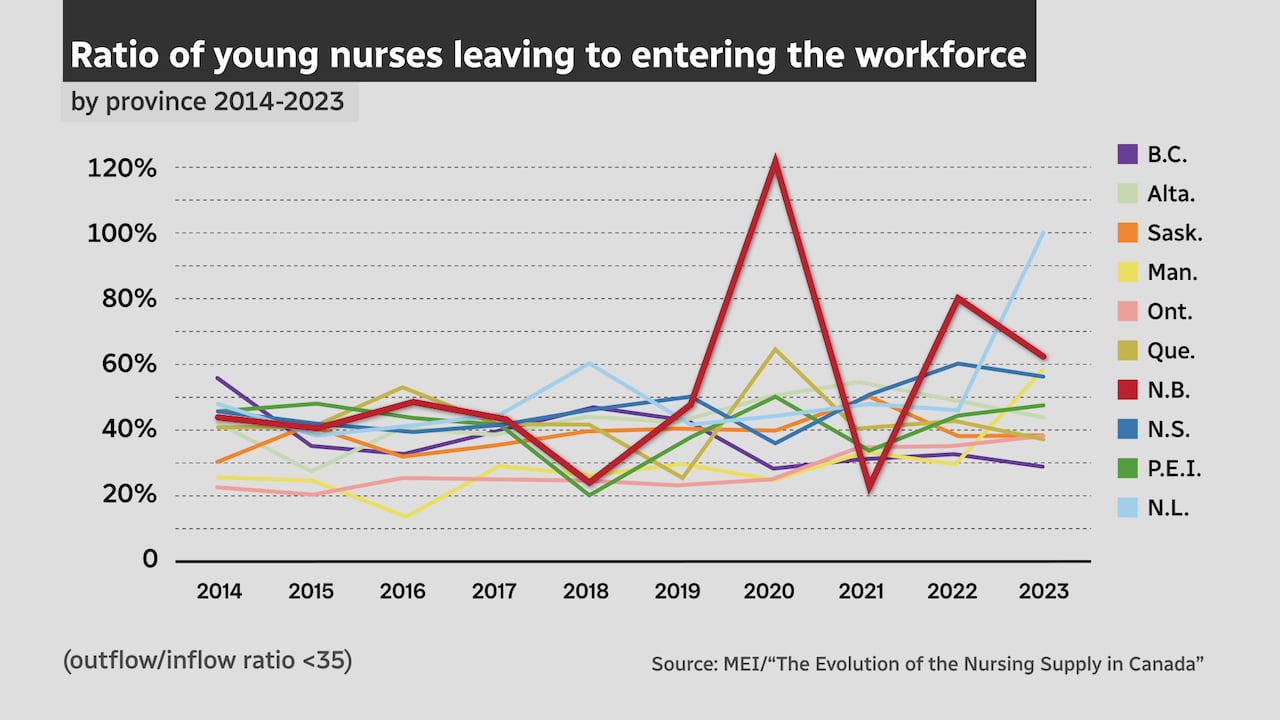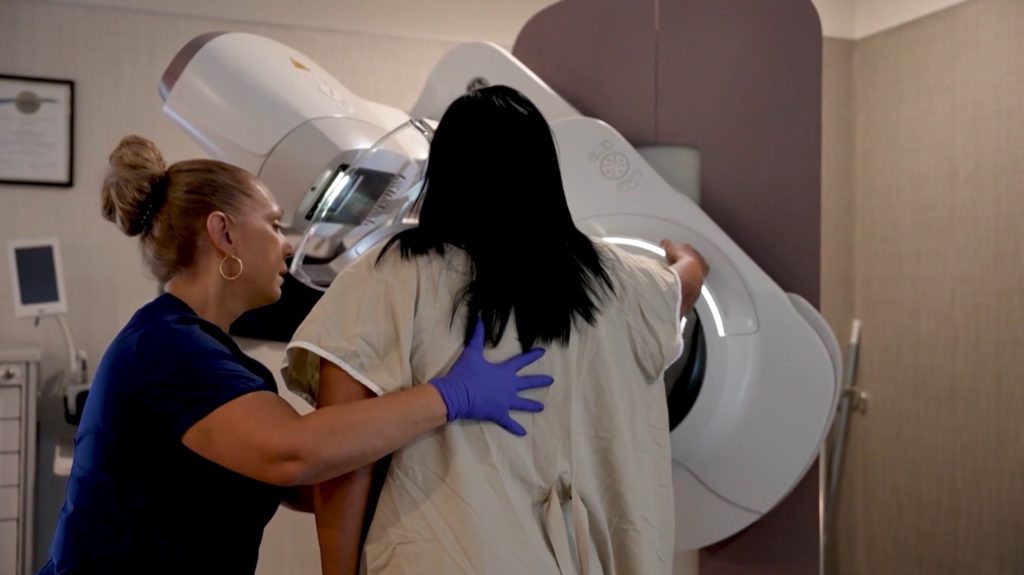62 young nurses leave N.B. for every 100 who start, think-tank says

For every 100 nurses under the age of 35 who started in New Brunswick in 2023, there were 62 other young nurses who left, according to a new report by a public-policy think tank.
New Brunswick had the second worst retention of young nurses in the country, the Montreal Economic Institute, known as MEI, found.
Only Newfoundland and Labrador lost young nurses at a faster rate, with 98 leaving the workforce for every 100 who joined. This was likely in part due to the end of many short-term travel nurse contracts during the COVID-19 pandemic, says the report titled The Evolution of the Nursing Supply in Canada.
The national average was 40, based on the latest registration data available from the Canadian Institute for Health Information, collected from provincial and territorial regulatory bodies.
The “exodus” of young nurses is concerning because it adds to the shortage of health-care workers and puts more pressure on an already-strained health-care system, said Emmanuelle Faubert, an economist at the institute who wrote the report in collaboration with research intern Olivia Martiskainen.
Heavier workloads fall on the nurses who do stay “and so you end up with a lot of nurses burning out,” Faubert said.

(Submitted by MEI)
“You cannot expect a burnt-out nurse to provide the same quality of care simply because it’s physically not possible,” she said.
“But at the same time, a burnt-out nurse … they can only maintain the same pace for so long until they simply leave.
“And so this becomes a vicious cycle … and it just puts the whole health-care system in jeopardy long-term.”
37% increase in ‘outflow’ since 2014
Nurses are the largest group of regulated health professionals in Canada, with more than 450,000 members, the report released Wednesday notes. They work in hospitals, primary care centres and long-term care settings.
Although New Brunswick’s “outflow” of young nurses did improve from 2022, when it stood at 80 for every 100, the latest figure still represents a 37 per cent increase since 2014, according to Faubert.

More specific New Brunswick numbers were not included in the report, but Faubert told CBC News that in 2023, the inflow of nurses under 35 to the province’s health-care system totalled 804 and the outflow totalled 498. Some 3,334 nurses, including both employed and not employed, were eligible to practise in New Brunswick that year.
Only two provinces showed an improvement in the outflow/inflow ratio during that nine-year period — B.C., which cut its turnover of young nurses by 50 per cent, to 27 for every 100, and Quebec, which dropped eight per cent to 37 for every 100, she said.
Compounding the problem, Faubert said, is that the average age of nurses registered to practise across Canada is decreasing.
In 2023, nearly 31 per cent were under 35, compared to about 28 per cent in 2014, meaning a larger proportion of nurses are now in this age group with a higher turnover rate than the general nursing population, she said.
Nursing vacancies have tripled across the country in the past five years, jumping to more than 41,000 in 2023, from about 13,000 in 2018, according to the report.
Meanwhile, the demand for health care is increasing, with an aging and growing population.
No surprise to union president
Paula Doucet, president of the New Brunswick Nurses Union, said she couldn’t provide young nurse numbers for the province but isn’t surprised by MEI’s findings, based on what she’s hearing from the roughly 200 nurses attending annual general meetings in Moncton this week, Many of them are young and new to the system.
“They’re saying they were almost set up to fail because there’s a lack of support and orientation and a cushion for them,” Doucet said.
“It’s initiation by fire. They’re being put in charge of very unstable patients and in many cases, units.”
They need more support, Doucet said.

“They’re saying, ‘This is not what I signed up for. I’m not able to work safely and provide the care that my patients, residents and clients should receive.’ And therefore they make choices to leave the profession, which is sad.”
Doucet said she has also heard some “pretty terrible stories” from internationally educated nurses who have been recruited with the promise of permanent work. Once here, they discover they can’t get the hours they require to become recognized as a registered nurse in New Brunswick, she said.
Horizon, Vitalité data
Data from the two regional health networks on hires and departures of nurses of all ages also seems to align with MEI’s findings, Doucet said.
“We do know that there is a fair amount of nurses that have left the system due to various reasons,” she said. “There’s really not a net gain.”
The Horizon data, obtained through a Right to Information request, shows it hired 835 nurses between April 2024 and April 2025, 416 of whom were full-time, and saw 459 departures during that same period, leaving 594 vacancies.
Vitalité has not yet provided updated data, according to the union, but during the 2024 calendar year, it hired 360 nurses and 178 nurses left, including 81 who had six years or less of service, the data shows. Vitalité lists 453 vacancies, as of Dec. 31, 2024.
New contract should help
Doucet points to remuneration and working conditions, noting New Brunswick’s registered nurses, licensed practical nurses and nurse practitioners were, until recently, the lowest paid across the country.
She’s hopeful a new agreement, which 68 per cent of members voted last month to accept, will help, but she could not discuss any details.
Health Minister Dr. John Dornan said he believes the new contract is one of several measures that will make a difference, along with retention bonuses, two new nursing programs and new spots.
Work environment is key, he told reporters at the legislature.

(Tara King-Stewart/CBC)
“Nurses sometimes leave because they’re burnt out. And they’re burnt out because there’s too much work on them per nurse, per shift.
“So if we recruit more nurses … people will be more inclined to stay.”
Unsustainable losses
The continuing loss of young nurses is unsustainable, Faubert said.
“Let’s always remember that yes, nurses are essential to provide care, all levels of care, but also young nurses, nurses under the age of 35, they are the experienced nurses of tomorrow,” she said.
“And so we need nurses to stay for now, yes, but also to make sure that we are able to maintain services later on.”
Faubert believes there are several reasons nurses are leaving their jobs, based on a 2025 survey conducted by the Canadian Federation of Nurses Unions.
More than a third of nurses reported working involuntary overtime in the past six months, six in 10 said they experienced some form of violence or abuse at work in the past year, and one in four show clinical signs of anxiety, depression or burnout.
More privatization proposed
Faubert proposes several possible solutions, including more privatization.
“Essentially competition, what it does in the labour market is it allows employers to compete for employees and when there’s competition — we’ve seen it during the worker shortage — you have increased salaries, you also also have increased benefits and better working conditions,” she said.
Allowing nurses to work for travel nurse agencies, private clinics, or telehealth companies would enable them to better control their hours and maintain a work-life balance, Faubert said.
A nurse, it doesn’t matter where they work. They treat patients … they help patients. And that is what we need.– Emmanuelle Faubert, economist at MEI
She downplayed the suggestion it could lure more nurses away from the public sector, arguing it could help prevent burned-out nurses from leaving the profession altogether by providing another option for them.
“A nurse, it doesn’t matter where they work. They treat patients … they help patients. And that is what we need.”
Asked about New Brunswick’s experience with costly travel nurse contracts in 2022, when Canadian Health Labs charged about $300 an hour per nurse — roughly six times what a local staff nurse earns, Faubert said she favours a collaboration between the public and private systems.
Warns of two-tiered system
The head of the union strongly disagrees with increased privatization, which she described as a “code word for stripping away the publicly funded, publicly delivered and universally accessible health care to any New Brunswicker.
“Creating a private system is creating a two-tiered system and care should not be based on the ability to pay, it should be based on the need that you require to see someone for your ailment,” Doucet said.
A better approach, she suggested, would be setting nurse-patient ratios, which makes it safer for patients and more attractive and safer for the nurses as well.
Other suggestions from Faubert include leveraging artificial intelligence to reduce nurses’ workloads by automating administrative tasks and renegotiating union contracts to “reward skills and competence over seniority.”
B.C. offers model for retention
New Brunswick should also follow the lead of B.C. — the province with the lowest ratio of young nurses leaving and the province most improved over 10 years, Faubert said.
She pointed to B.C.’s shift-swapping pools, which allow nurses to trade shifts without administrative approval.
In 2022, the British Columbia College of Nurses and Midwives also streamlined the accreditation process for internationally educated nurses, Faubert said.
The “triple-track” assessment allows them to submit a single application for three nursing designations: registered nurse, licensed practical nurse, and health-care assistant. This reduces costs and potential delays of having to start the application process all over again for a different designation if they’re unsuccessful for a particular one, she said.
In addition, the B.C. government has launched BCHealthCareers, which provides recruitment services and information to international health-care professionals, including personalized support to navigate the licensing, job search, and relocation process.
link







